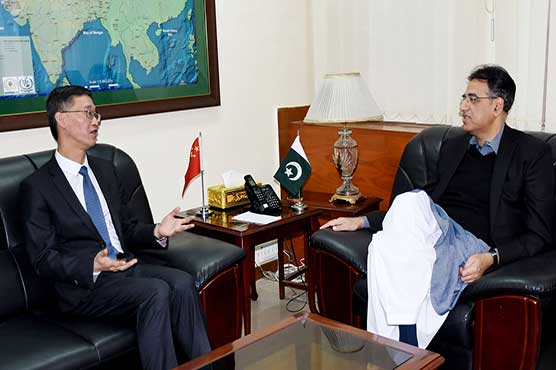Planning Minister Asad Umar has said that ongoing phase of the China-Pakistan Economic Corridor (CPEC) would bring about socio-economic benefits for the welfare of the people, noting that the bilateral framework agreements have now entered the second phase with a focus on poverty alleviation, agriculture and industrial cooperation.
The minister was talking to Chinese Ambassador Yao Jing in Islamabad on Friday. Both dignitaries discussed future projects which would be included under CPEC.
Minister for Planning, Development and Reform and Special Initiative, Asad Umar said that ongoing phase of CPEC would bring about socio-economic benefits for the welfare of the people. He said this while talking to Chinese Ambassador Yao Jing who called on him in Islamabad. pic.twitter.com/uGKOoUQfvf
— Government of Pakistan (@GovtofPakistan) November 22, 2019
Chinese Ambassador Yao Jing congratulated the minister on assuming the office of the planning minister. He expressed satisfaction over the progress of CPEC, saying that the pace of the CPEC projects has accelerated after the incumbent government came into power and hoped that bilateral partnership between the two friendly countries would further strengthen in the future.
CPEC is in the initial stage, and policymakers and government officials consider CPEC as a “game-changer” for both the countries, as, potentially, it will generate numerous business and employment opportunities for local citizens as well as international outreach.
Read more: US warns Pakistan of risks from CPEC
A study by MDPI on the perceived impacts of CPEC found that through the development of CPEC, local citizens perceive significant improvement in their lives, particularly the quality of life, better employment opportunities, and poverty reduction, while they have an insignificant perception about environmental protection and quality of education.
SSRN performed a statistical analysis to study the development vitality of the project which indicated that there will be 5.21 percent growth in social welfare in Pakistan, up till 2020. At provincial level highest growth in social welfare impact can be ranked as; in Balochistan (6.4 percent), Sindh (6.31 percent), KP (5.19 percent), and Punjab (3.5 percent), respectively.
Amidst such warning western media’s propaganda, Pakistan’s federal cabinet appointed retired Commander Southern Command Lt. General Asim Saleem Bajwa of Pakistan Army as head of the Pak-China Economic Corridor (CPEC).
The net impact can also be depicted by its three dimensions of social welfare; education 3.85 percent, health 4.74 percent and housing 8.6 percent, also indicating high growth in terms of living standards. Districts which have high level of poverty and unemployment will significantly improve quality of life relative to other districts.
This meeting came after US warnings to Pakistan regarding CPEC. Alice Wells, the acting assistant secretary of state for South Asia, explained that CPEC was not an aid to Pakistan but a form of financing that guarantees profits for Chinese state-owned enterprises, with little benefits for Islamabad.
Addressing the 5th CPEC Media Forum Chinese Ambassador to Pakistan Yao Jing, while rejecting US Acting Assistant Secretary of State for South Asia Alice Wells’ statement regarding CPEC, has said Pak-China relations are based on win-win cooperation and are mutually beneficial. pic.twitter.com/hNCLFA5hq1
— Ministry of Information & Broadcasting (@MoIB_Official) November 23, 2019
She noted that the multibillion-dollar initiative was driven by non-concessionary loans, with Chinese companies sending their own labor and material. “CPEC relies primarily on Chinese workers and supplies, even amid rising unemployment in Pakistan,” Wells said at the Woodrow Wilson International Center for Scholars.
Amidst such warnings and western media’s propaganda, Pakistan’s federal cabinet appointed retired Commander Southern Command Lt. General Asim Saleem Bajwa of Pakistan Army as head of the Pak-China Economic Corridor (CPEC).
Read more: Gen (ret) Asim Saleem Bajwa to head CPEC amid controversy and western propaganda
A summary has been sent to the federal cabinet for approval, which is expected to be accepted till the next meeting. According to sources, he will be appointed for four years.














